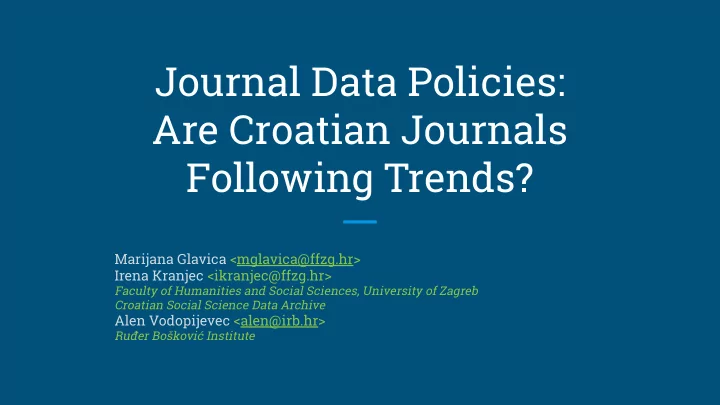

Journal Data Policies: Are Croatian Journals Following Trends? Marijana Glavica <mglavica@ffzg.hr> Irena Kranjec <ikranjec@ffzg.hr> Faculty of Humanities and Social Sciences, University of Zagreb Croatian Social Science Data Archive Alen Vodopijevec <alen@irb.hr> Ruđer Bošković Institute
Motivation We are building infrastructures for research data ● Thinking about how to persuade researchers about benefits of data sharing, ● our first focus was on: ○ using personal stories, few enthusiasts, bottom-up science policies ○ ○ funders requirements ● Journal publishers have a crucial role in changing researchers behavior!
The role of journal publishers "leverage point in the research process" (Lin & Strasser, 2014) ● ● "most effective policies are those that present themselves to researchers at a point in the research process at which there is an immediate incentive for compliance and the opportunity to do so" (Sturges, 2015) ● Journals have direct contact with authors Should collaborate with data archives, repository services, and funders ●
Recent studies about journal data policies Lack of clear data sharing and transparency policies in the majority of ● journals Higher Impact Factors journals are more likely to have data sharing policies; ● use data in peer review; require deposit of data in publicly available repositories; and refer to reproducibility as a rationale for sharing data Policies vary across disciplines - biological science journals are more likely ● than social science and mathematics journals to require data sharing (Resnik et al., 2019; Vasilevsky at al., 2018)
Existing guidelines for journal publishers ● Research data for journal editors by the Australian National Data Service 10 elements to consider in developing or refining a data policy - what, how, when, where ● Journal Research Data Policy Model Framework by The Journal Research Data (JoRD) Project, funded by JISC (Joint Information Systems Committee) stakeholder‐driven model for journal policies; feasibility study on the potential for a central service on journal research data policies. ● Transparency and Openness Promotion (TOP) Guidelines by the Center for Open Science ● Research Data Policy Framework for all journals and publishers by Data policy standardisation and implementation Interest Group (IG) of the Research Data Alliance (RDA)
Exemplar publishers Nature Journals Reporting standards and availability of data, materials, code and protocols A condition of publication in a Nature Research journal is that authors are required to make materials, data, code, and associated protocols promptly available to readers without undue qualifications. PLOS ONE https://journals.plos.org/plosone/s/data-availability PLOS journals require authors to make all data underlying the findings described in their manuscript fully available without restriction at the time of publication. Science https://www.sciencemag.org/authors/science-journals-editorial-policies TOP Guidelines
● Customizable options for creating a new norm in how science is conducted ● Modular, facilitating adoption in whole or in part
Croatian journals Mostly open access, available through Hrčak portal ● ● 357 journals were explored, all disciplines ● 1019 files instruction for authors ○ ○ guidelines for reviewers ethical guidelines ○ ○ other documents Software script - downloading files from Hrčak and for parsing Word and ● PDF KEYWORDS='data|podac|podat|supplement|dodatni.*materijal|arhiviran|archiv ed|archiving|deposit|pohran|reproduc|replicat|replikac|provjer|verif'
Main insights Mostly in ethical guidelines, not in guidelines for authors ● ● Data should be available upon request for review, or upon request from other researchers When public access to data was mentioned, nothing about where, how and ● for how long ● Some journals are mentioning reproducibility or verification
Authors may be asked to provide row data ● Data access and retention Authors may be asked to provide the raw data in connection with a paper for editorial review, and should be prepared to provide public access to such data (consistent with the ALPSP-STM Statement on Data and Databases), if practicable, and should in any event be prepared to retain such data for a reasonable time after publication. ● Authors are expected to keep all study data for later examination even after publication.
Should data be deposited? Specific types of data sharing Genetic information, such as DNA, RNA, or protein sequences, should be submitted to public data bases (GenBank, EMBL, etc.), and accession numbers should be available in Materials and methods. Voucher specimens must be made and deposited in a public herbarium. Prior to submitting the manuscript reporting the results of crystal structure determination(s), the authors should deposit the crystallographic data with the Cambridge Crystallographic Data Centre Other Supplemental online material. Supplemental material can be a video, dataset, fileset, sound file or anything which supports (and is pertinent to) your paper. We publish supplemental material online via Figshare. Find out more about supplemental material and how to submit it with your article.
Mentioning reproducibility or verification This is not about the data! - just interesting to see if reproducibility is ● mentioned as a way of doing science Mentioned in instructions for authors as a writing guide for methodologies ● Procedures should be described in sufficient detail to allow other researchers to reproduce the results. Describe statistical methods with enough detail to enable a knowledgeable reader with access to the original data to verify the reported results.
Registration of clinical trial Requires registration of trials in a public trials registry, as a condition of consideration for publication. Authors must provide the name and website address of the register and the trial registration number on submission. The journal will only accept trials that have been registered prospectively unless data collection began before 2006, in which case retrospective registration is acceptable.
Invitation for journal editors Guidelines exists! ● ● Infrastructure exists! Dabar ● ○ infrastructure for institutional repositories Croatian Social Science Data Archive ● ○ CESSDA ERIC Service Provider ○ domain specific arhiv.podataka@ffzg.hr
Recommend
More recommend